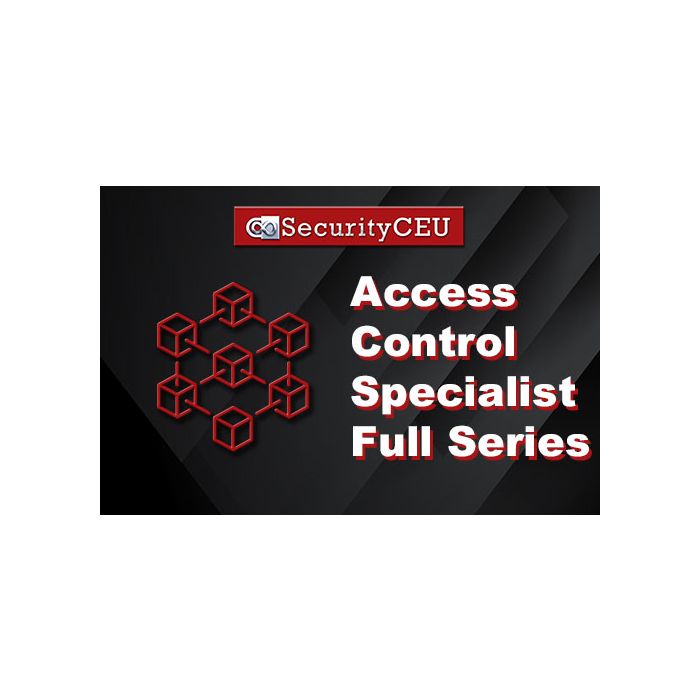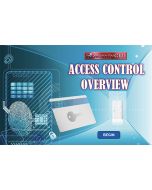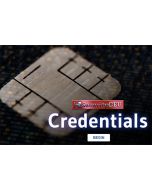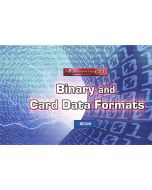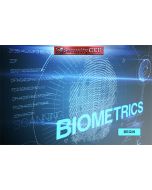Access Control Specialist Training - Full Series
As an increasingly important area of security and safety in businesses and other organizations, the field of access control has emerged as a promising career path. The Access Control Specialist certification is the industry standard for understanding the basics of electronic access control systems, and allowing individuals to acquire the knowledge and skills needed to succeed in this growing field.
Access control is a vital security measure for any business or organization. It helps to ensure that only authorized individuals have access to certain areas, and it can also be used to track and monitor access. The Access Control Training and Specialist Certification Course from SecurityCEU.com is designed to provide professionals with the skills and knowledge they need to effectively implement and manage access control systems. The course covers a range of topics, including system design, installation, operation, and maintenance.
The Access Control Specialist full series is a comprehensive training program designed to give individuals the knowledge and skills they need to succeed in the rapidly growing field of access control. With six courses covering everything from the basics of electronic systems to modern biometric and smartcard applications, this certification provides a solid foundation in access control and equips learners with the skills and knowledge needed to excel in this exciting industry. As more and more businesses seek ways to improve their security, there is a high demand for qualified access control specialists around the world, making this an excellent choice for anyone seeking a rewarding career. With the right training and certification, anyone can take their first step toward success as an access control specialist.
Read more about the course in the detailed description below.
The Access Control Specialist full series from SecurityCEU.com is designed to provide professionals with the skills and knowledge they need to effectively implement and manage access control systems. The course covers a wide range of topics, including system design, installation, operation, and maintenance. This electronic access control certification is essential for anyone who wants to stay up-to-date on the latest security trends and techniques. Whether you are an installer, service tech, sales rep, or decision maker in charge of purchasing electronic access control systems, this course will give you the information you need to be successful in your role. So if you're looking to further your knowledge and advance your career in the security industry, consider enrolling in the Access Control Specialist Training today!
Access control training is a must for anyone who wants to work in the security industry. This training provides the knowledge and skills necessary to understand access control systems. It also covers the various technologies used in access control, including the history of access control systems up to modern day biometric and smartcard applications. After completing this training, security professionals can become certified in access control by passing the included exam. The certification demonstrates that the individual has the skills and knowledge needed to work in this field.
See the full Access Control series of courses below.
The Access Control Specialist series begins with the Access Control Overview Module and concepts that are often ignored in electronic security training. Card readers are used to control openings that people, vehicles and even goods pass through. We will look at the physical structure of doors and frames and have a brief discussion of parking gates, mantraps and other controlling mechanisms. Electrified locking hardware gets a thorough exploration including egress methods and cautionary notes on Fire and Life Safety codes.
Physical access control (doors, etc.) will be contrasted with logical access control (PCs, networks and data) at a basic level. All of the components that make up an access system will be defined including credentials (cards, fobs, etc.) readers, controllers and user interface (host) systems. Many different card/reader technologies will be covered along with their comparative strengths and weaknesses. The Access Control Overview module is the foundation on which the rest of the Access Control Specialist Level One is built. Even experienced EAC (Electronic Access Control) professionals will learn some secrets and tricks here.
This module is called Credentials, but without their matching Readers they don’t do much. All popular card and reader technologies will be explained including several forms of Magnetic Stripe, Wiegand, 125 kHz Proximity, Contactless Smartcards and more. Upon completing this module, you will have a clear understanding of the available choices and the defining characteristics that determine what is best for each field application. ISO (International Standards Organization) standards and other governing factors are included.
The credentials are what the users are given and their selection is important the final experience of each person. Choosing the correct credential goes beyond technology to a very functional set of considerations. This module will explain the key aspects of this component of access control systems in a way that will make designing and implementing systems easier for any technician to handle.
One of the most confusing, even intimidating questions will often be “What format should these cards have?” This module can’t answer that question for you, but it will give you all the facts to be able to make the right choice every time. The structure of formats and their function in the credential, reader and controller are clearly explained.
Since binary arithmetic (1 and 0) is the foundation of formats, the module begins with its thorough exploration. You will learn how to count in binary and how it is used to construct card data formats. It is critical that you understand the fundamentals of what makes up the card data formats in order to make the right selections when it comes to an actual access control application.
One of the most confusing, even intimidating questions will often be “What format should these cards have?” This module can’t answer that question for you, but it will give you all the facts to be able to make the right choice every time. The structure of formats and their function in the credential, reader and controller are clearly explained.
The mere mention of using smartcards in access control can cause a blank look to appear on the face of an otherwise competent technician or sales person. It doesn’t need to be that way. This module will strip away the fog around smartcards and show how appropriate they can be for any access application. The focus is on contactless smartcards but contact cards are also explained. All the terminology and regulating standards will be described in layman’s language. Extreme data security and multi-function capabilities are two huge advantages of contactless cards. The security feature called mutual authentication is cleverly revealed through animation graphics in a way that anyone can understand how it works. Security and storage of multiple types of data such as a card number, biometric template and virtual cash are all explained.
We included a high-level overview of the most popular biometric technologies to give you solid knowledge on this challenging subject. Fingerprint, hand geometry, iris recognition, facial recognition and other choices are explained. The difference between passive and active biometric systems is also covered.
Biometric products can be used in a stand-alone mode, connected to a central database or employ contactless smartcards to carry the bio data for the cardholder. Advantages and liabilities of each technology and each method of deployment are covered in an informative and unbiased manner. Biometrics will no longer be a mystery.
How do you install an access control system? In fact, what is a “system”? Our final module starts with a short review of the components that make up an access control system. We then will look at many options, starting with single door stand-alone devices to widely distributed systems using IP connections over LAN/WAN networks. Wiring standards are explained as is the idea of POE (Power Over Ethernet).
Integration of CCTV with access control is an obvious part of larger access systems. The compelling rationale for doing it is thoroughly explained and the methods for accomplishing it are discussed. Advanced students will be pleased with coverage of APIs (Application Programming Interface) and SDKs (Software Development Kit) and their place in the growing system integration market.
This course is a component of the Access Control Specialist (ACS) Level One certification. It may be taken on its own or ordered as part of the ACS Level One training bundle for a lower overall cost.
| State | Hours | Special Instructions |
| Louisiana | 1 | |
| Mississippi | 1 | |
| New Jersey | 1 | This course is approved for 1.00 hours of continuing education by the NJ Fire Alarm, Burglar Alarm and Locksmith Advisory Committee. If you are submitting this course for CEUs in NJ, you must contact us with your NJ license number so we may provide you with the appropriate certificate upon completing the course. Please email support@securityceu.com or call 502-254-1590 when you have finished taking the online content. We will then create your NJ specific certificate and email it to you within 24 hours |
| Tennessee | 1 | |
| Utah | 1 | This course is approved for 1.00 hours of continuing education by the Utah Division of Occupational and Professional Licensing for Construction Trades. If you will be taking this course for CEUs in Utah, you must notify us and provide your license number and company name so we may submit the appropriate documentation. Please email support@securityceu.com or call 502-254-1590. |
| State | Hours | Special Instructions |
| Louisiana | 1 | |
| Mississippi | 1 | |
| Tennessee | 1 | |
| North Carolina | 1 | This course is approved for 1.00 hours of continuing education by the North Carolina ASLB. If you will be taking this course for CEUs in North Carolina, you must notify us and provide your license number and company name so we may submit the appropriate documentation. Please email support@securityceu.com or call 502-254-1590. |
| Utah | 1 | This course is approved for 1.00 hours of continuing education by the Utah Division of Occupational and Professional Licensing for Construction Trades. If you will be taking this course for CEUs in Utah, you must notify us and provide your license number and company name so we may submit the appropriate documentation. Please email support@securityceu.com or call 502-254-1590. |
| State | Hours | Special Instructions |
| Louisiana | 1 | |
| Mississippi | 1 | |
| New Jersey | 1 | This course is approved for 1.00 hours of continuing education by the NJ Fire Alarm, Burglar Alarm and Locksmith Advisory Committee. If you are submitting this course for CEUs in NJ, you must contact us with your NJ license number so we may provide you with the appropriate certificate upon completing the course. Please email support@securityceu.com or call 502-254-1590 when you have finished taking the online content. We will then create your NJ specific certificate and email it to you within 24 hours |
| Tennessee | 1 |
| State | Hours | Special Instructions |
| Louisiana | 1 | |
| Mississippi | 1 | |
| New Jersey | 1 | This course is approved for 1.00 hours of continuing education by the NJ Fire Alarm, Burglar Alarm and Locksmith Advisory Committee. If you are submitting this course for CEUs in NJ, you must contact us with your NJ license number so we may provide you with the appropriate certificate upon completing the course. Please email support@securityceu.com or call 502-254-1590 when you have finished taking the online content. We will then create your NJ specific certificate and email it to you within 24 hours |
| North Carolina | 1 | This course is approved for 1.00 hours of continuing education by the North Carolina ASLB. If you will be taking this course for CEUs in North Carolina, you must notify us and provide your license number and company name so we may submit the appropriate documentation. Please email support@securityceu.com or call 502-254-1590. |
| Tennessee | 1 |
| State | Hours | Special Instructions |
| Louisiana | 1 | |
| Mississippi | 1 | |
| New Jersey | 1 | This course is approved for 1.00 hours of continuing education by the NJ Fire Alarm, Burglar Alarm and Locksmith Advisory Committee. If you are submitting this course for CEUs in NJ, you must contact us with your NJ license number so we may provide you with the appropriate certificate upon completing the course. Please email support@securityceu.com or call 502-254-1590 when you have finished taking the online content. We will then create your NJ specific certificate and email it to you within 24 hours |
| Tennessee | 1 | |
| Utah | 1 | This course is approved for 1.00 hours of continuing education by the Utah Division of Occupational and Professional Licensing for Construction Trades. If you will be taking this course for CEUs in Utah, you must notify us and provide your license number and company name so we may submit the appropriate documentation. Please email support@securityceu.com or call 502-254-1590. |
| State | Hours | Special Instructions |
| Louisiana | 1 | |
| Mississippi | 1 | |
| South Dakota | 1 | This course is approved for 1.00 hours of continuing education by the SD Electrical Commission. If you are submitting this course for CEUs in SD, you must contact us with your SD license number so we may provide you with the appropriate documentation. Please email support@securityceu.com or call 502-254-1590. |
| Tennessee | 1 | |
| North Carolina | 1 | This course is approved for 1.00 hours of continuing education by the North Carolina ASLB. If you will be taking this course for CEUs in North Carolina, you must notify us and provide your license number and company name so we may submit the appropriate documentation. Please email support@securityceu.com or call 502-254-1590. |

